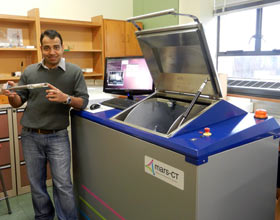5:11pm

Centre for Bioengineering post-doctoral fellow Raj Panta with the MARS scanner and a sample of atherosclerotic plaque.
Soft, unstable plaque that breaks off and blocks arteries is a major cause of strokes and heart attacks, even in those traditionally considered at low risk.
The University of Otago, Christchurch's Associate Professor Nigel Anderson has been awarded a Heart Foundation grant to use latest scanning technology to analyse plaque samples and determine which types pose the greatest risk of breaking.
The radiologist is a member of the campus' Centre for Bioengineering. Its director Associate Professor Anthony Butler was one of the inventors of the revolutionary MARS CT scanner. Associate Professor Anderson will use the scanner to identify the most lethal plaque types.
Summary of funded projects
Associate Professor Nigel Anderson: Studying the effectiveness of the MARS T spectral scanner to detect unstable plaque.
Dr Allamanda Faatoese (Christchurch Heart Institute): Studying the cardiovascular health profile of Christchurch's Pacific community.
Dr Anna Pilbrow (Christchurch Heart Institute): Finding better ways GPs can assess patients' risk of heart disease.
Professor Vicky Cameron (Christchurch Heart Institute): Studying how healthy patients DNA and blood samples differ from those with heart disease.
Dr John Pickering: Measuring levels of the hormone troponin in emergency department patients with chest pain to predict their risk of an imminent heart attack.
